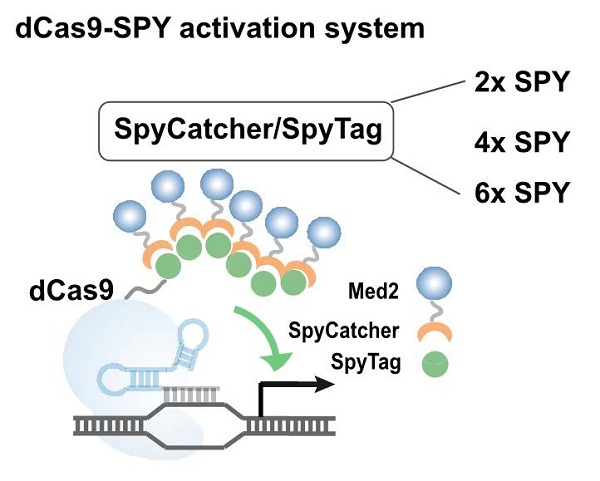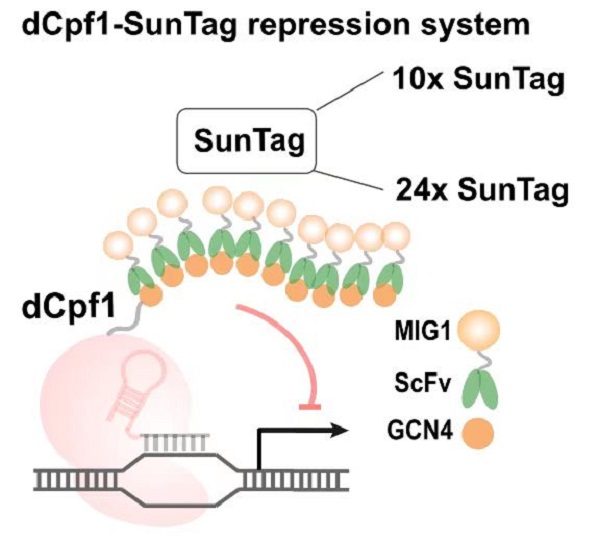Recently, Prof. Hou Jin from Prof. Qi Qingsheng's group in State Key Laboratory of Microbial Technology, Shandong University published an article entitled "CRISPR-mediated protein-tagging signal amplification systems for efficient transcriptional activation and repression inSaccharomyces cerevisiae" in Nucleic Acids Research, to describe the development of a new tool for CRISPR-mediated transcriptional regulation. Prof. Hou Jin is the corresponding author of the paper, PhD student Zhai Haotian is the first author, and Shandong University is the sole corresponding author institute.
Saccharomyces cerevisiaeis an important eukaryotic model microorganism and has been widely applied in fundamental research and the production of various chemicals. Its ability to efficiently and precisely control the expression of multiple genes is valuable for metabolic engineering. The clustered regularly interspaced short palindromic repeats (CRISPR)-mediated regulation enables complex gene expression programming, and has been widely used for the regulation of gene expression of multiple genes. However, in yeast, nuclease-deficient CRISPR proteins is generally directed fused with the transcriptional activators or repressors. The regulation efficiency is often limited by the efficiency of the regulators, limiting the application in synthetic biology and metabolic engineering inS. cerevisiae.


Figure 1. Design principle of CRISPR-mediated transcriptional signal amplification system for protein scaffolds. Design of dCas9-SPY activation system and dCpf1-SunTag repression system
This article developed CRISPR-mediated protein-tagging signal amplification system for simultaneous multiplexed gene activation and repression inS. cerevisiae.The authors first improved the regulatory efficiency by screening and optimizing transcriptional regulators in the CRISPR system. Then they innovatively introduced two sets of protein scaffolding systems (SPY and SunTag systems) into the CRISPR system for the recruitment of transcriptional activators and repressors respectively, which can simultaneously recruit multiple transcription factors to nuclease-deficient CRISPR proteins,resulting in a significant increase in transcriptionalregulation efficiency. The gene activation and repression efficiency reached as high as 34.9-fold and 95%, respectively, being 3.8- and 8.6-fold higher than those observed on the direct fusion of regulators withnuclease-deficient CRISPR proteinsrespectively. Then the orthogonal bifunctional CRISPR-mediated transcriptional regulation system was applied to regulate the expression of genes associated with 3-hydroxypropanoic acid production, which significantly improved the efficiency of 3-hydroxypropionic acid synthesis.
At present, CRISPR-mediated regulatory systems have been widely used in transcriptional regulation, and have played an important role in both basic research and strain engineering. However, the low regulation efficiency is a drawback of the system. In this study, a CRISPR scaffold protein-mediated signal amplification system was developed in yeast for the first time. By recruiting transcription factors, the efficiency of transcriptional regulation was significantly improved, and the efficient reprogramming of multiple gene expression was achieved. Though the introduction of two CRISPR-mediated protein tagging system, the activation and repression can be complete orthogonal. This system has better gene regulation efficiency than the commonly used CRISPR regulation system that directly fuses Cas proteins with transcription factors. This novel CRISPR regulation system will have broad application in metabolic engineering and basic research.
Link to the article: https://academic.oup.com/nar/advance-article-abstract/doi/10.1093/nar/gkac463/6596094
